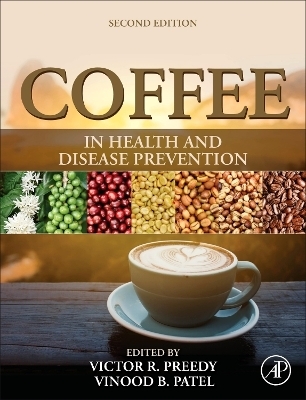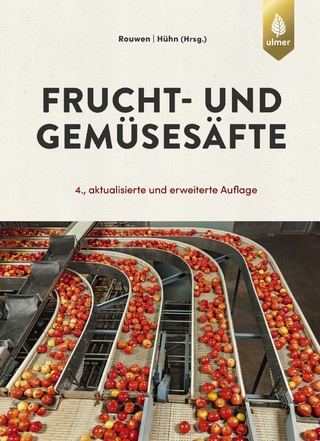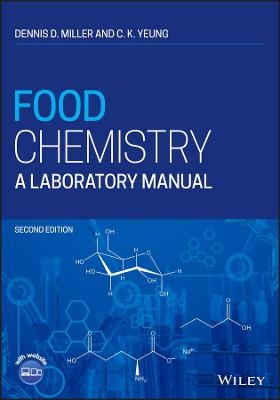
Coffee in Health and Disease Prevention
Academic Press Inc (Verlag)
978-0-443-13868-3 (ISBN)
Coffee in Health and Disease Prevention, Second Edition, is the only book on the market that covers all varieties of coffee in one volume and their potential benefits and risks to human health. This is an essential reference for researchers in nutrition, dietetics, food science, biochemistry, and public health.
Victor R. Preedy BSc, PhD, DSc, FRSB, FRSPH, FRSC, FRCPath graduated with an Honours Degree in Biology and Physiology with Pharmacology. After gaining his University of London PhD, he received his Membership of the Royal College of Pathologists. He was later awarded his second doctorate (DSc), for his contribution to protein metabolism in health and disease. He is Professor of Clinical Biochemistry (Hon) at King’s College Hospital and Emeritus Professor of Nutritional Biochemistry at King’s College London. He has Honorary Professorships at the University of Hull, and the University of Suffolk. Professor Preedy was the Founding Director and then long-term Director of the Genomics Centre at King’s College London from 2006 to 2020. Professor Preedy has been awarded fellowships of the Royal Society of Biology, the Royal College of Pathologists, the Royal Society for the Promotion of Health, the Royal Institute of Public Health, the Royal Society for Public Health, the Royal Society of Chemistry and the Royal Society of Medicine. He carried out research when attached to the National Heart Hospital (part of Imperial College London), The School of Pharmacy (now part of University College London) and the MRC Centre at Northwick Park Hospital. He has collaborated with international research groups in Finland, Japan, Australia, USA, and Germany. To his credit, Professor Preedy has published over 750 articles, which includes peer-reviewed manuscripts based on original research, abstracts and symposium presentations, reviews and edited books. Vinood B. Patel, BSc, PhD, FRSC, is currently Professor in Clinical Biochemistry at the University of Westminster. In 2014 Dr Patel was elected as a Fellow to The Royal Society of Chemistry. Dr Patel graduated from the University of Portsmouth with a degree in Pharmacology and completed his PhD in protein metabolism from King’s College London in 1997. His postdoctoral work was carried out at Wake Forest University Baptist Medical School, NC, USA studying structural-functional alterations to mitochondrial ribosomes, where he developed novel techniques to characterize their biophysical properties. Research is being undertaken to study the role of nutrients, antioxidants, phytochemicals, iron, alcohol and fatty acids in the pathophysiology of liver disease. Other areas of interest are identifying new biomarkers that can be used for the diagnosis and prognosis of disease and understanding mitochondrial oxidative stress in neurological disorders and iron dysregulation in diabetes. Dr Patel is a nationally and internationally recognized researcher and has several edited biomedical books related to the use or investigation of active agents or components. These books include The Handbook of Nutrition, Diet, and Epigenetics, Branched Chain Amino Acids in Clinical Nutrition, Cancer: Oxidative Stress and Dietary Antioxidants, Toxicology: Oxidative Stress and Dietary Antioxidants, Molecular Nutrition: Vitamins, The Neuroscience of Pain, Cognitive Behavioural Therapy. He is Editor of the ten-volume series Biomarkers in Disease: Methods, Discoveries and Applications.
Section I: Coffee, coffee drinking, and varieties
1. An introduction to the coffee plant and seeds
Adriana Farah and Thiago Ferreira
2. Coffea arabica
Rallinari Diaz-Gómez, José Sandoval-Cortes and Cristóbal N. Aguilar
3. Coffea canephora (robusta): Quality and health benefits
Carmen Santiago, José Sandoval-Cortes, Mónica L. Chávez González, Xóchitl Ruelas-Chacón, Miguel A. Aguilar-González and Cristóbal N. Aguilar
4. Green coffee
Fransiska Maria Christianty and Fifteen Aprila Fajrin
5. Evolution and organization of Coffea genomes
Perla Hamon, Serge Hamon, Mathilde Dupeyron, Nathalie Eva Raharimalala, Rickarlos Bezandry, Emmanuel Couturon, Dominique Crouzillat, Sélastique Akaffou and Romain Guyot
6. Genomics to reveal divergence and convergence between coffee species
Seyed Mehdi Jazayeri, Reyhaneh Sadat Jazayeri, Habib MotieGhader, Darío Fernando Herrera-Jácome, Karen Rafaela Mayorga Morejon and Ronald Oswaldo Villamar-Torres
7. Caffeine-free species in the genus Coffea
Perla Hamon, Nathalie Eva Raharimala, Sélastique Akaffou, Emmanuel Couturon, Dominique Crouzillat, Serge Hamon, Mathilde Dupeyron and Romain Guyot
8. Characterization of coffee genes involved in isoprenoid and diterpene metabolic pathways
Suzana Tiemi Ivamoto-Suzuki, Nícollas Gabriel de Oliveira Aprigio, Luiz Filipe Protasio Pereira and Douglas Silva Domingues
9. The antioxidant system in coffee
Igor Cesarino and Paulo Mazzafera
Section II: Production and processing
10. Origin, properties, and possibilities of the use and reuse of spent coffee grounds
Ana Cervera-Mata, Alejandro Fernández-Arteaga, Silvia Pastoriza, Gabriel Delgado and José Ángel Rufián-Henares
11. Coffee beans and processing
Maik Kleinwãchter, Gerhard Bytof and Dirk Selmar
12. Postharvest changes in coffee: A focus on chlorogenic acids and antioxidant activities
Fareeya Kulapichitr and Keith R. Cadwallader
13. Changes in coffee beans during roasting
Feifei Wei and Masaru Tanokura
14. Trace levels of plant protection products derived from coffee roasting instead of agricultural
practices
Thierry Delatour, Mathieu Dubois and Viviane Theurillat
15. Assessing the effects of coffee roasting conditions on sensory preferences: A narrative review
Wan Abd Al Qadr Imad Wan-Mohtar, Sarina Abdul Halim-Lim and Mohd Nizam Lani
16. Espresso coffee preparation and the importance of volatiles
Giovanni Caprioli, Gianni Sagratini, Sauro Vittori and Agnese Santanatoglia
17. The aroma of instant coffee: Its release and modulation by encapsulation
Rodolfo Campos Zanin, Chahan Yeretzian and Samo Smrke
Section III: Compositional, nutritional, and metabolic aspects
A: Compositional
18. The compositional differences between wild and domesticated coffee
Seyed Mehdi Jazayeri, Reyhaneh Sadat Jazayeri, Maryam Sadat Beheshti Shooshtari, Ricardo Augusto Luna Murillo, Pedro Darío Cedeño Loja and Ronald Oswaldo Villamar-Torres
19. Components in coffee, their concentrations, and methods of analysis
Dhanya B. Sen, Rajesh A. Maheshwari, Dillip Kumar Dash, Manojkumar K. Munde and Ashim Kumar Sen
20. Nuclear magnetic resonance spectroscopic profiles of coffee
Emanuele C.S. Oliveira, Bárbara Z. Agnoletti and Jair C.C. Freitas
21. Derivatives of atractyligenin in coffee
Roman Lang
22. Chlorogenic acids in different coffees
Kouame Fulbert Oussou, Ozlem Kilic Buyukkurt, Gamze Guclu, Hasim Kelebek and Serkan Selli
23. Diterpenes in coffee
Elena Guercia, Federico Berti, Cristina Forzato and Luciano Navarini
24. Influence of melanoidins on aroma perception of coffee
Michael Gigl and Oliver Frank
25. Coffee dietary fiber: Features and hypocholesterolemic effects
Fernanda Machado, Manuel A. Coimbra and Filipe Coreta-Gomes
B: Nutritional and metabolic
26. Linking coffee consumption and vitamin D status
Mahmoud S. Abu-Samak, Shady H. Awwad and Beisan Mohammad
27. Coffee and the glycemic response in obesity
Lange Ewa and Pałkowska-Goździk Ewelina
28. Coffee intake and reduced Dual-Energy X-ray absorptiometry quantification of adiposity
Chao Cao, Ruixuan Wang and Lin Yang
29. Linking metabolic syndrome and coffee drinking
Basma Damiri, Thabet Zidan and Iyad Maqboul
30. The cardiovascular effects of coffee consumption: An overview
Stanisław Surma and Gregory Y.H. Lip
Section IV: General aspects of the effects of coffee
Part A: Organs and conditions
31. Highlights in the history of the science of coffee and health
Maria Letícia Galluzzi and Adriana Farah
32. A Comprehensive Review of Coffee’s Health Impacts on Older Adults
Weida Lyu and Huijuan Jia
33. Coffee and arterial stiffness
Andressa Bressan Pedroso, Diego Chemello and Patrícia Chagas
34. Coffee and its metabolites in relation to asthma and lung function
Yueh-Ying Han and Juan C. Celedón
35. Head and neck cancer and the protective associations with coffee consumption
Luciane Bresciani Salaroli, Cleodice Alves Martins, Camila Bruneli do Prado, Júlia Rabelo Santos Ferreira, Olívia Perim Galvão de Podestá and Luciana Bicalho Cevolani Pires
36. Investigations of the effects of coffee in chemotherapy
Sandra Kalthoff and Christian P. Strassburg
37. Coffee, caffeine, and delaying of cataract development
Martin Kronschläger and Manuel Ruiss
38. Coffee and periodontal health: To protect or to harm?
Taufan Bramantoro, Agung Krismariono, Muhammad Subhan Amir, Alexander Patera Nugraha,
Wahyuning Ratih Irmalia and Amalia Ayu Zulfiana
39. Effects of coffee on gut microbiota in health and diseases
Shrilakshmi Hegde and Xuan-Zheng Shi
B: Cells and cellular biology
40. Coffee and effects on platelets
Iván Palomo, Eduardo Fuentes, Lyanne Rodríguez, Francisca Tellería and Magdalena Sepúlveda
41. Human genetics and caffeine: Functional single-nucleotide polymorphism and response to
caffeine intake
Agata Chmurzynska
42. Coffee compounds and their effects on miRNAs during gastrointestinal health and disease
Letícia Cardoso Valente, Guilherme Ribeiro Romualdo and Luís Fernando Barbisan
43. Chronotype, circadian rhythm, and coffee consumption
Mahmut Bodur and Mustafa Volkan Yılmaz
44. Coffea robusta extracts and antibacterial effects: Escherichia coli and beyond
Yohanes Krisnantyo Adi Pinandito, Alfisar Shidqi and Wiwin Retnowati
Section V: Focused areas, specific coffee components, and effects
45. Cafestol: Impact of coffee diterpene on cancer cells and associated antiinflammatory response
Maria Alice Esteves da Silva, Ana Laura Macedo Brand, Claudia Moraes de Rezende and Patrícia Fernandes
46. Caffeic acid and derivatives as antiviral agents
Motohiko Ogawa and Masayoshi Fukasawa
47. Hypertension and effects of coffee-derived analytes caffeic and chlorogenic acids
Odunayo M. Agunloye, Akintoye O. Francis and Ganiyu Oboh
48. Sleep and the impact of high caffeine consumption: Implications for coffee consumption
Silvia V. Conde, Joana F. Sacramento and Fátima O. Martins
49. The role of caffeine in health via comparisons between caffeinated and decaffeinated coffee: A focus on colon cancer
Vinicius Kannen and Sergio Britto Garcia
50. Caffeine, coffee and effects on the liver
Marta Alegret, Juan Carlos Laguna and Núria Roglans
51. Caffeine and its molecular and physiological effects on skeletal muscle
Mojtaba Kaviani and Solmaz Salari
52. Caffeine cardiovascular toxicity: too much of a good thing—an update
Cláudia M. Deus, Ana F. Branco, Paulo J. Oliveira and Vilma A. Sardão
53. Chlorogenic acid in energy metabolism on efficacy and mechanisms of action
Xuguang Li and Huijuan Jia
54. Chlorogenic acid utilization in the diabetic and prediabetic states
Milad Abdollahi, Samaneh Shirkhani and Sayyed Mohammad Marandi
55. Nanoencapsulation of coffee: Controlled release of chlorogenic acid
Aratrika Ray, Nivas Desai and Pushpa S. Murthy
56. ent-Kaurane-type diterpenes as components in coffee and their biological activities
Minh Hao Hoang, Linh Nham Nguyen and Thi Nga Vo
57. Role of trigonelline, a bioactive alkaloid in coffee, for kidney stone prevention
Paleerath Peerapen and Visith Thongboonkerd
Section VI: Behavior, brain, and neurological systems
58. Coffee and caffeine: Impact on mood, cognition, and physical activity
Valerio Manippa, Caterina Padulo and Alfredo Brancucci
59. Coffee consumption: Links with anxiety and depression
Merve İlhan-Esgin and Esma Asil
60. The brain response to coffee consumption: Electroencephalogram (EEG) changes and implications
Cristian Felipe Blanco-Díaz, Cristian David Guerrero-Méndez, Alvaro David Orjuela-Caňón, Teodiano Bastos-Filho, Andrés Felipe Ruiz-Olaya and Sebastián Jaramillo-Isaza
61. Caffeine and potential use in Alzheimer’s disease
Luca Büschgens, Daniel Janitschke, Anna Andrea Lauer, Marcus Otto Walter Grimm and Oliver Wirths
62. Chlorogenic acid as a neuroprotectant: A focus on Parkinson’s disease
Ritu Soni, Nishant Sharma, Jigna S. Shah and Amit Khairnar
63. Investigating kahweol as a component of coffee: Effects on brain mitochondria
Marcos Roberto de Oliveira
64. Coffee and the brain—gut axis
Paula Gallego-Barceló and Raquel Abalo
Section VII: Adverse components and adverse effects of coffee and related products
65. Exploring the relationship between caffeine consumption and atrial fibrillation: Unraveling the
connection
Anna Vittoria Mattioli
66. Formation, level, reduction methods, and health risk assessment of acrylamide in coffee
products
Burhan Basaran and Yağmur Demirel Özbek
67. The mycotoxin ochratoxin A: Levels in coffee
Annibal Duarte Pereira Netto, Michelle Costa da Silva and Ademário Iris da Silva Junior
68. Toxic compounds in coffee: Polycyclic aromatic hydrocarbons
Fabio Beccari, Arianna Binello, Silvia Tagliapietra and Giancarlo Cravotto
Section VIII: Comparison of coffee and tea
69. Comparing coffee and tea consumption regarding DNA methylation
Ferenc Budán, László Szabó, Domokos Máthé, József L. Szentpéteri, Dávid Szép and Attila Sík
70. Coffee and tea consumption and pregnancy
Ehab Eshak, Masayuki Teramoto and Hiroyasu Iso
Section IX: Byproducts of coffee production and their uses
71. Uses of industrially produced spent coffee grounds
Juan Camilo Osorio-Arias, Yudy Duarte-Correa and Laura Sofia Torres-Valenzuela
72. Prebiotic potential of coffee and coffee by-products
Marlene Machado, M.Beatriz P.P. Oliveira, Helena Ferreira and Rita C. Alves
73. Coffee silverskin: potential health benefits and current applications
Juliana A. Barreto-Peixoto, Nelson Andrade, M. Beatriz P.P. Oliveira, Fátima Martel and Rita C. Alves
74. In silico molecular modeling of coffee silverskin
Haniyeh Noormohammadi, Faezeh Fathi, Reza M. Kouchaksaraee, Rita C. Alves and M. Beatriz P.P. Oliveira
Section X: Resources and selective methods
75. Highlights for the advanced analysis of bioactive compounds in coffee
Aileen Pua, Rui Min Vivian Goh, Yunle Huang, Lionel Jublot, Shao Quan Liu, Bin Yu and Dejian Huang
76. Methods for extracting bioactive compounds from coffee and its by-products
Nuntawat Khat-udomkiri and Hla Myo
77. Genetic methods to evaluate evidence for causal effect of coffee on health
Kitty Pham and Elina Hyppönen
78. Caffeic and chlorogenic acid in coffee and methods for their detection
Alexandra Virginia Bounegru and Constantin Apetrei
79. Ochratoxin A in coffee: occurrence, health impact, regulation, and analytical methods
Moez Elsaadani, Nermin Gamal, Abdullah M.M. Elbadry and Muhamed Elsaadani
80. Profiling new genotypes of coffee sensory, compositional, and biological aspects
Arthur Merigueti de Souza Costa, Daniele Alves Marinho, Tassio da Silva de Souza, Maria Amélia Gava Ferrão and Rodrigo Scherer
81. Recommended resources for coffee in health and disease prevention
Rajkumar Rajendram, Vinood B. Patel and Victor R. Preedy
| Erscheinungsdatum | 24.09.2024 |
|---|---|
| Verlagsort | San Diego |
| Sprache | englisch |
| Maße | 216 x 276 mm |
| Gewicht | 2980 g |
| Themenwelt | Technik ► Lebensmitteltechnologie |
| ISBN-10 | 0-443-13868-0 / 0443138680 |
| ISBN-13 | 978-0-443-13868-3 / 9780443138683 |
| Zustand | Neuware |
| Informationen gemäß Produktsicherheitsverordnung (GPSR) | |
| Haben Sie eine Frage zum Produkt? |
aus dem Bereich


